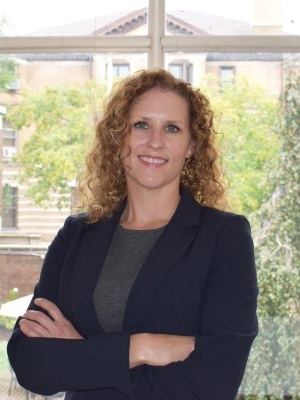Overlooked: SWAN student shines light on disability research in social work with 2020 Brehler Scholars award
 Doctoral student Kathryn Wright has won the Wayne State University School of Social Work's 2020 Elizabeth N. Brehler Scholarship with an article exploring the need for expanded research on disabilities in social work centered on the perspectives of disabled individuals.
Doctoral student Kathryn Wright has won the Wayne State University School of Social Work's 2020 Elizabeth N. Brehler Scholarship with an article exploring the need for expanded research on disabilities in social work centered on the perspectives of disabled individuals.
The Elizabeth N. Brehler Scholars Program, established in 1991 by Richard Brehler in memory of his wife, begun as an annual manuscript competition that allowed undergraduate and graduate students to produce a scholarly work. In 2020, the Brehler Program was reimagined to support the dissemination of social work research and the publication of scholarly works by Wayne State School of Social Work Ph.D. students. In the spirit of Elizabeth N. Brehler, competition submissions focused on one of three social work themes 1) the urban mission, ethics, values and understanding of personal bias, 2) social justice and transformation of bias in teaching, and 3) the utilization of community-engaged research methods that reflect self-awareness, personal reflection, and cultural humility.
Wright, the inaugural recipient of the new Brehler Program, is pursuing a transdisciplinary joint-doctorate degree in social work and anthropology (SWAN). Drawing from interdisciplinary theoretical and practical approaches to social problems, the SWAN Program provides Wright with the opportunity to conduct research focused on community and sense of self among individuals with cognitive impairments and other disabilities in the the K-12 educational environment. Wright has worked closely with local organizations and community members to expand her research into advocacy and coalition-building with people of different cognitive abilities. Wright has also collaborated with diverse SWAN faculty to advance her knowledge of social work macro practice and policy advocacy, as well as socio-cultural anthropology and ethnography during her studies.
Wright's winning article, "Scoping Review of Disability in Social Work: An analysis of models and themes", is currently in revision for publication in the Journal of Social Work and relates to the Brehler Program theme of the social work urban mission, ethics, values and understanding of personal bias in research. One of the important discoveries Wright made in conducting her research was the extent to which social work disability research is focused on the individuals surrounding those with disabilities, rather than on the individuals with the disabilities themselves.
We have far more research, for example, on what it feels like to be a parent of a disabled child than we do on what it feels like to be a disabled child. While individual research projects in this format do yield important and useful insights, as a whole the picture is incomplete. The field of social work research must expand its parameters to include work centered on the perspectives of disabled people themselves. - Kathryn Wright
Although not specifically address in this article, Wright also takes a close look at the root of this lack in social work research exploring why such a bias exists. Wright speculates that personal and institutional biases against individuals with disabilities plays a large role. "My research shows little attention to social justice for individuals with disabilities within the body of research, potentially indexing another bias among social work researchers, that people with disabilities are not in need of social justice advocacy," stated Wright. "We need to create a new model of disability, a social work model of disability in environment, that would help develop a more positive perspective on disability as well as broaden the frame for future research on disabilities in social work."
For the review committee, Wright's submission stayed true to the heart of the Brehler Program and its mission to explore the principles of self-awareness and bias in social work teaching, research and practice.
Kathryn Wright's paper brings critical attention to the ways that personal and institutional bias can influence the ways research represents disability. She challenges the models of understanding disability that focus on a characterization of only risk or burden, and provides important recommendations for reframing the discussion of disability in education, practice, and research from a strengths perspective. - Social Work Doctoral Program Director and Brehler Program Chair Poco Kernsmith
Through the generous gift of Richard Brehler and the support of the Brehler family, the School will continue to foster the burgeoning careers of doctoral students and the dissemination of research conducted in the heart of Detroit for years to come.
Learn more about how you can make a gift to the Wayne State School of Social Work by contacting Individual Giving Officer, Katy Willoughby at kwilloughby@wayne.edu or 313-577-4429.